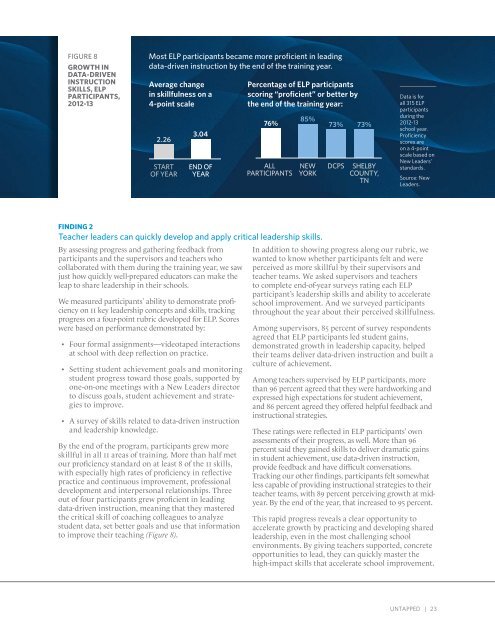NewLeaders_Untapped
NewLeaders_Untapped
NewLeaders_Untapped
You also want an ePaper? Increase the reach of your titles
YUMPU automatically turns print PDFs into web optimized ePapers that Google loves.
FIGURE 8GROWTH INDATA-DRIVENINSTRUCTIONSKILLS, ELPPARTICIPANTS,2012-13Most ELP participants became more proficient in leadingdata-driven instruction by the end of the training year.Average changein skillfulness on a4-point scale2.26STARTOF YEAR3.04END OFYEARPercentage of ELP participantsscoring “proficient” or better bythe end of the training year:76%ALLPARTICIPANTS85%NEWYORK73%DCPS73%SHELBYCOUNTY,TNData is forall 315 ELPparticipantsduring the2012-13school year.Proficiencyscores areon a 4-pointscale based onNew Leaders’standards.Source: <strong>NewLeaders</strong>.FINDING 2Teacher leaders can quickly develop and apply critical leadership skills.By assessing progress and gathering feedback fromparticipants and the supervisors and teachers whocollaborated with them during the training year, we sawjust how quickly well-prepared educators can make theleap to share leadership in their schools.We measured participants’ ability to demonstrate proficiencyon 11 key leadership concepts and skills, trackingprogress on a four-point rubric developed for ELP. Scoreswere based on performance demonstrated by:• Four formal assignments—videotaped interactionsat school with deep reflection on practice.• Setting student achievement goals and monitoringstudent progress toward those goals, supported byone-on-one meetings with a New Leaders directorto discuss goals, student achievement and strategiesto improve.• A survey of skills related to data-driven instructionand leadership knowledge.By the end of the program, participants grew moreskillful in all 11 areas of training. More than half metour proficiency standard on at least 8 of the 11 skills,with especially high rates of proficiency in reflectivepractice and continuous improvement, professionaldevelopment and interpersonal relationships. Threeout of four participants grew proficient in leadingdata-driven instruction, meaning that they masteredthe critical skill of coaching colleagues to analyzestudent data, set better goals and use that informationto improve their teaching (Figure 8).In addition to showing progress along our rubric, wewanted to know whether participants felt and wereperceived as more skillful by their supervisors andteacher teams. We asked supervisors and teachersto complete end-of-year surveys rating each ELPparticipant’s leadership skills and ability to accelerateschool improvement. And we surveyed participantsthroughout the year about their perceived skillfulness.Among supervisors, 85 percent of survey respondentsagreed that ELP participants led student gains,demonstrated growth in leadership capacity, helpedtheir teams deliver data-driven instruction and built aculture of achievement.Among teachers supervised by ELP participants, morethan 96 percent agreed that they were hardworking andexpressed high expectations for student achievement,and 86 percent agreed they offered helpful feedback andinstructional strategies.These ratings were reflected in ELP participants’ ownassessments of their progress, as well. More than 96percent said they gained skills to deliver dramatic gainsin student achievement, use data-driven instruction,provide feedback and have difficult conversations.Tracking our other findings, participants felt somewhatless capable of providing instructional strategies to theirteacher teams, with 89 percent perceiving growth at midyear.By the end of the year, that increased to 95 percent.This rapid progress reveals a clear opportunity toaccelerate growth by practicing and developing sharedleadership, even in the most challenging schoolenvironments. By giving teachers supported, concreteopportunities to lead, they can quickly master thehigh-impact skills that accelerate school improvement.UNTAPPED | 23


